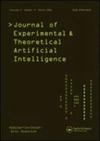基于最优特征选择和增强递归神经网络的计算机辅助植物叶片分类
IF 1.7
4区 计算机科学
Q3 COMPUTER SCIENCE, ARTIFICIAL INTELLIGENCE
Journal of Experimental & Theoretical Artificial Intelligence
Pub Date : 2022-03-08
DOI:10.1080/0952813X.2022.2046178
引用次数: 4
摘要
摘要提出了一种基于增强分割和最优特征选择的植物叶片分类模型。首先是预处理,采用RGB到灰度的转换、直方图均衡化和中值滤波。进一步,将优化后的U-Net模型用于叶片分割。一旦对叶子进行分割,就会提取出一组与形状、颜色和纹理相关的特征。由于特征向量的长度似乎很高,从而影响网络训练,因此采用最优特征选择来降低数据维数并建立鲁棒分类模型。在这里,最优特征选择采用新的混合算法,即乌鸦-电鱼优化算法(C-EFO),它是电鱼优化算法(EFO)和乌鸦搜索算法(CSA)的杂交。最后,使用基于C-EFO改进的深度学习模型增强递归神经网络(E-RNN)进行分类。分析表明,C-EFO+Opt-U-Net+E-RNN的准确率分别比k-NN高4.7%,比VGG16高3.5%,比LSTM高3.5%,比RNN高2.75%。最后,在两个植物叶片数据库上的实验结果表明,与传统模型相比,该方法是有效可行的。本文章由计算机程序翻译,如有差异,请以英文原文为准。
A computer aided plant leaf classification based on optimal feature selection and enhanced recurrent neural network
ABSTRACT This paper develops a new plant leaf classification model based on enhanced segmentation and optimal feature selection. The first process is the pre-processing, in which RGB to grey-scale conversion, histogram equalisation, and median filtering are adopted. Further, the optimised U-Net model is used for the leaf segmentation. Once the segmentation of the leaf is done, a set of features are extracted related to shape, colour, and texture. Since the length of the feature vector seems to be high that in turn affects the network training, optimal feature selection is adopted in order to reduce data dimensionality and to build robust classification models. Here, the optimal feature selection is performed by the new hybrid algorithm, namely Crow-Electric Fish Optimization (C-EFO), which is the hybridisation of Electric Fish Optimization (EFO) and Crow Search Algorithm (CSA). Finally, the deep learning model termed as Enhanced Recurrent Neural Network (E-RNN) is used for performing the classification with the improvement based on C-EFO. From the analysis, the accuracy of the proposed C-EFO+Opt-U-Net+E-RNN is 4.7% better than k-NN, 3.5% better than VGG16, 3.5% better than LSTM, and 2.75% better than RNN, respectively. Finally, the experimental results on two plant leaf databases show that the proposed method is quite effective and feasible when compared to conventional models.
求助全文
通过发布文献求助,成功后即可免费获取论文全文。
去求助
来源期刊
CiteScore
6.10
自引率
4.50%
发文量
89
审稿时长
>12 weeks
期刊介绍:
Journal of Experimental & Theoretical Artificial Intelligence (JETAI) is a world leading journal dedicated to publishing high quality, rigorously reviewed, original papers in artificial intelligence (AI) research.
The journal features work in all subfields of AI research and accepts both theoretical and applied research. Topics covered include, but are not limited to, the following:
• cognitive science
• games
• learning
• knowledge representation
• memory and neural system modelling
• perception
• problem-solving

 求助内容:
求助内容: 应助结果提醒方式:
应助结果提醒方式:


